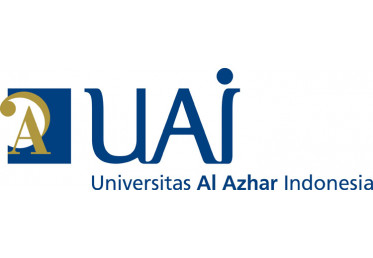Thursday (2/2), Faculty of Law of University Al-Azhar Indonesia (UAI) held an international seminar by involving several speakers from around the world in the Auditorium Arifin Panigoro, 3rd floor of UAI on hybrid-mode. As legal education has faced a transitional situation from pandemic to endemic, there are lots of pros and cons in providing the learning and teaching process. To meet the current needs, the legal educators from Indonesia, Malaysia, Netherlands, and Australia shared their insight in how they overcome and take advantage of the existing situation on transforming legal education to meet stakeholder expectations and technological advances.
Before the event began, Prof. Dr. Asep Saefuddin, M.Sc (The Rector of UAI) opened with a speech. Technology is very advanced, especially in education. Prof. Asep is really proud that before the pandemic hit, Faculty of Law together with several faculties in UAI has launched the program of blended learning. Because of this, the students from legal education in UAI have become accustomed to online learning.

Legal education at Faculty of Law is the most stable one in terms of credentiality and it cannot be replaced”. (Prof. Asep)
Firstly, Ahmad Safik, SE., MH, LLM, the representative from UAI, shared that there are 68 million students from basic education and higher education that are affected by the pandemic in Indonesia. The pandemic has restricted society and brought them to the full usage of technology which is covered by the systems such as e-health platform, digital cash transfer, e-payment systems, and especially online learning in education. These gave opportunities and possible futures that we can predict for legal education that will morph from a place to a process that makes law a skill not a practice. Nevertheless, advanced technology also allowed students to contract cheating, exam cheating, etc. Accordingly, this has become his concern as a legal educator.

The legal educators can share their experiences and that is price that is compatible for students in legal education can exclusively get.” (Prof. Sonny)
Secondly, Prof. Sonny Zulhuda, PhD, from International Islamic University Malaysia (IIUM), added his thought that talking to this topic is not purely legal issues but education itself. He gave an example on how he has handled this in his university after this pandemic. His objective as an educator in legal education is to produce a balanced law graduate with both knowledge and practical skills. With the pros and cons that have been elaborated by Mr. Safik, he continued the topic that what legal education can improve for the future is visualizing the work. Students can be involved in learning legal education by creating video, graphic design, and so forth at the same time. For instance, he has applied the flip classroom method and students are allowed to be creative as they can while learning law. At this time, the lesson learned from Prof. Sonny said that the only thing we can do is brace for the new challenges post pandemic. Answering the cons of the full usage of technology that enables students to access lots of knowledge from anywhere instead of learning in legal education, Prof. Sonny emphasized that the legal educator can provide experience that the students cannot find anywhere.
Thirdly, Dr. Prosper Maguchu, LLM, the delegation from Vrije Universiteit, presented about the Future of Legal Education from his point of view. He explained from the origins of legal education, legal education during covid 19, and zoom law school. The future of legal education will implicate technology and it has become a part of legal education. The action that can be taken is to reflect on online pedagogy and learn how it affects it in law. The legal educator also can improve to involve students in class polls and quizzes engaged while learning law. That is how legal educators can embrace the future of legal education.
Last but not least, Prof. Veronica Taylor, who joined virtually, from Australia National University expressed her concern to the current education as technology has really transformed these past years. The Australian system of education used to provide the students with pencil or pen in papers during exams in legal education. With the pandemic situation, it has been switched where students are able to do the exam virtually and somehow it increases the number of plagiarism and copying. On the other hand, legal educators can make sure of those negative effects during the learning process by teaching digital responsibility. Hence, Legal educators can navigate students to do things on their own and utilize the impact of technology to make class more interesting.
Finally, after all the speakers shared their insight on how the future of legal Education will be, it is clear that there are always advantages and disadvantages in the utilization of technology in legal education. However, legal educators can direct as well as embrace the usage as long as reasonable. Also, delivering the opening remarks were Dr. Yusup Hidayat, S.Ag., M.H. (Dean of Faculty of Law of UAI) and Nisa Istiani, SH., MLI, (The Moderator of the Event). They expressed thanks to the speakers, Faculty of Law of UAI that held this event together with office of International Affairs of UAI as the form of implementation from the extension of new agreement between UAI and IIUM in last 2022 so the representative from IIUM was involved in. (TSH)

